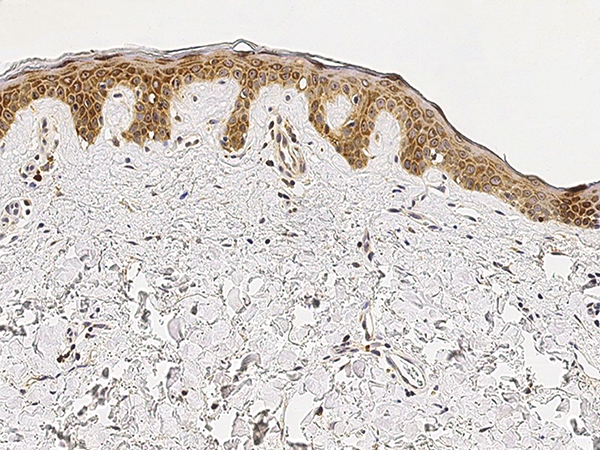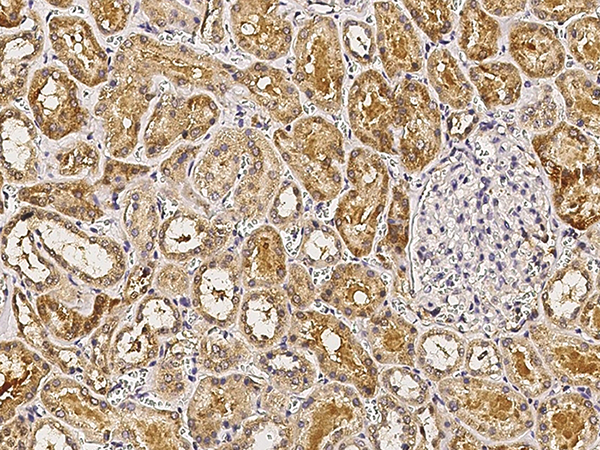-
Product Name
Anti-IL-1RA/IL1RN antibody
- Documents
-
Description
Rabbit monoclonal to IL-1RA/IL1RN
-
Tested applications
IHC-P
-
Species reactivity
Human IL-1RA / IL1RN
-
Alternative names
DIRA antibody; F630041P17Rik antibody; ICIL-1RA antibody; IL1F3 antibody; IL-1RA antibody; IL-1ra antibody; IL-1ra3 antibody; IL1RN antibody; Il1rn antibody; IRAP antibody; MGC10430 antibody; MVCD4 antibody; RP23-218B17.2 antibody; IL1RA antibody; DIRA antibody; IRAP antibody; IL1F3 antibody; IL1RA antibody; MVCD4 antibody; IL-1RN antibody; IL-1ra antibody; IL-1ra3 antibody; ICIL-1RA antibody; IL-1ra antibody; F630041P17Rik antibody
-
Isotype
Rabbit IgG
-
Preparation
This antibody was obtained from a rabbit immunized with a synthetic peptide corresponding to the center region of the human IL1Ra / IL1RN.
-
Clonality
Monoclonal
-
Formulation
0.2 μm filtered solution in PBS
-
Storage instructions
This antibody can be stored at 2℃-8℃ for one month without detectable loss of activity. Antibody products are stable for twelve months from date of receipt when stored at -20℃ to -80℃. Preservative-Free.
Sodium azide is recommended to avoid contamination (final concentration 0.05%-0.1%). It is toxic to cells and should be disposed of properly. Avoid repeated freeze-thaw cycles. -
Applications
IHC-P: 5-20 μg/mL
-
Validations

IL-1RA / IL1RN Antibody, Rabbit MAb, Immunohistochemistry
Immunochemical staining of human IL1RA in human skin with rabbit monoclonal antibody (10 µg/mL, formalin-fixed paraffin embedded sections).

IL-1RA / IL1RN Antibody, Rabbit MAb, Immunohistochemistry
Immunochemical staining of human IL1RA in human kidney with rabbit monoclonal antibody (10 µg/mL, formalin-fixed paraffin embedded sections).
-
Background
Interleukin-1 receptor antagonist (IL-1RA) also known as IL1RN is a member of the interleukin 1 cytokine family. This protein inhibits the activities of interleukin 1, alpha (IL1A) and interleukin 1, beta (IL1B), and modulates a variety of interleukin 1 related immune and inflammatory responses. A polymorphism of this protein encoding gene is reported to be associated with increased risk of osteoporotic fractures and gastric cancer. IL-1RA/IL1RN may inhibit the activity of IL-1 by binding to its receptor and it has no IL-1 like activity. Genetic variation in IL-1RA/IL1RN is associated with susceptibility to microvascular complications of diabetes type 4 (MVCD4). These are pathological conditions that develop in numerous tissues and organs as a consequence of diabetes mellitus. They include diabetic retinopathy, diabetic nephropathy leading to end-stage renal disease, and diabetic neuropathy. Diabetic retinopathy remains the major cause of new-onset blindness among diabetic adults. It is characterized by vascular permeability and increased tissue ischemia and angiogenesis. Defects in IL-1RA/IL1RN are the cause of interleukin 1 receptor antagonist deficiency (DIRA) which is also known as deficiency of interleukin 1 receptor antagonist. Autoinflammatory diseases manifest inflammation without evidence of infection, high-titer autoantibodies, or autoreactive T-cells. DIRA is a rare, autosomal recessive, genetic autoinflammatory disease that results in sterile multifocal osteomyelitis, and pustulosis from birth.
-
References
- Langdahl BL, et al. (2000) Osteoporotic fractures are associated with an 86-base pair repeat polymorphism in the interleukin-1--receptor antagonist gene but not with polymorphisms in the interleukin-1beta gene. J Bone Miner. 15 (3): 402-14.
- El-Omar EM, et al. (2000) Interleukin-1 polymorphisms associated with increased risk of gastric cancer. Nature. 404 (6776): 398-402.
- Steinkasserer A, et al. (1992) The human IL-1 receptor antagonist gene (IL1RN) maps to chromosome 2q14-q21, in the region of the IL-1 alpha and IL-1 beta loci. Genomics. 13 (3): 654-7.
Related Products / Services
Please note: All products are "FOR RESEARCH USE ONLY AND ARE NOT INTENDED FOR DIAGNOSTIC OR THERAPEUTIC USE"
